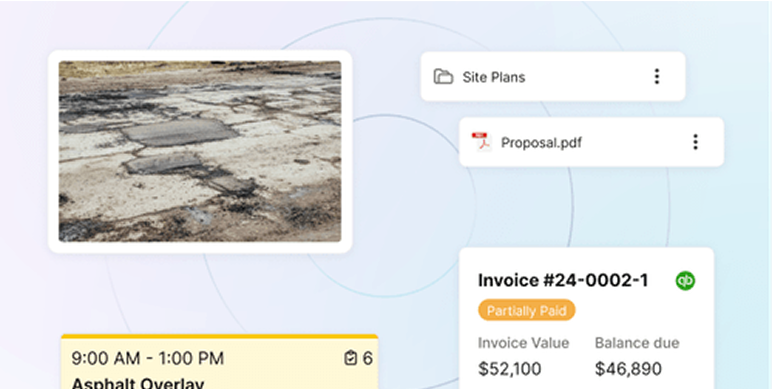The 5 Best Heat-Resistant Boots for Asphalt Paving in 2026
The best boots for asphalt paving combine extreme heat resistance with all-day comfort.
HexArmor's Asphalt Boot leads with 572°F protection, whereas the budget-friendly RockRooster AK232 offers solid 500°F resistance.
Just like paving contractors rely on platforms like OneCrew to protect their operations from costly mistakes, the right boots protect your crews from hazardous working conditions.
Working on hot asphalt without proper footwear feels like walking on coals barefoot, and when fresh asphalt reaches 300°F, regular work boots literally melt under pressure.
Heat-resistant details include a sole that resists contact heat up to 572°F, two times the temperature of hot asphalt. After testing dozens of asphalt work boots, I've found five that actually stand up to the punishing heat while keeping your feet comfortable through long shifts.
5 Best Boots for Asphalt Paving: TL;DR
The 5 best boots for asphalt paving are HexArmor Asphalt Boot, Brunt Ryng Low, RockRooster AK232, Thorogood 1957 Series, and Red Wing Traction Tred.
Here’s a quick comparative chart:
HexArmor Asphalt Boot
HexArmor Asphalt Boot ranks #1 for maximum heat protection with 572°F resistance.
Key features
- 5-layer sole construction blocks heat better than any competitor
- 572°F contact heat resistance doubles typical work boot protection
- Non-marking sole technology prevents tread marks in fresh asphalt
Pros
- Interior boot temp is 29°F cooler than the EN ISO standard
- Composite toe rebounds to its original shape after impact
- Zero break-in time required for immediate comfort
Cons
- Higher price point than most competitors
- Flat sole design limits traction on loose gravel
- Not widely available in retail stores
Pricing: Available at $190 to $280 on Amazon
Bottom line
HexArmor's Asphalt Boot justifies its premium price for crews working exclusively on hot asphalt. 572°F heat protection and immediate comfort make it ideal for paving specialists who need maximum protection without compromise.
Brunt Ryng Low
The Ryng Low is a hybrid performance work shoe with a lightweight and breathable construction that is good for hot-weather work.
Key features
- Nano composite safety toe weighs 15% less than steel
- SWITCH-FIT adjustable width system converts from D to EE width instantly
- Nylon-blended textile upper maximizes breathability in heat
Pros
- Ultralight design, starting at about 1.3 pounds per boot, depending on size
- Heat resistance up to 572°F matches top competitors
- Athletic styling works on and off the jobsite
Cons
- Low-top design offers less ankle support
- Textile upper may wear faster than leather
- Limited availability in wide sizes beyond EE
Pricing: Available from about $119 to $150 at Brunt Workwear
Bottom line
The Ryng Low excels for workers who prioritize lightweight comfort and modern styling. Perfect for younger crews or those transitioning between jobsite and office environments.
Note: Looking for comprehensive paving equipment? Check out our guide on essential sealcoating equipment for contractors expanding their services.
RockRooster AK232
RockRooster AK232 delivers the best value with 500°F heat resistance and professional-grade protection at an entry-level price point.
Key features
- PORON insole with Microban technology provides antimicrobial protection
- CoolMAX lining manages temperature and moisture effectively
- Wide width design accommodates broader feet comfortably
Pros
- Outstanding value at under $120
- Antistatic protection meets ESD Standard EN 61340
- Steel toe meets ASTM F2413 safety standards
Cons
- Lower heat resistance (500°F) than other competitors
- Heavier than composite toe alternatives
- Limited color options available
Pricing: Available from around $89 to $129 on Amazon
Bottom line
RockRooster's AK232 offers the best value for crews needing basic heat protection without breaking your budget. Ideal for companies outfitting multiple workers or those new to asphalt work.
Thorogood 1957 Series
Thorogood 1957 Series combines American craftsmanship with modern safety features for long-term durability.
Key features
- MAXWear Wedge outsole outlasts the competition by 30%
- Goodyear storm welt construction enables multiple resolings
- Waterproof membrane system keeps feet dry in all conditions
Pros
- American-made quality with high durability
- Comfortable wedge sole reduces foot fatigue
- Classic moc-toe styling appeals to traditional workers
Cons
- Wedge sole collects debris more than flat designs
- Higher initial investment required
- Longer break-in period than synthetic alternatives
Pricing: Available from about $264 to $299 on Amazon
Bottom line
Thorogood's 1957 Series rewards patient workers with long-term value. The resoleable construction and American craftsmanship make it perfect for career paving professionals.
Note: Need additional paving supplies? Check out our article on parking lot striping supplies to complete your equipment arsenal.
Red Wing Traction Tred
Red Wing Traction Tred offers premium slip resistance with HRO soles that resist heat up to 475°F.
Key features
- Vibram LiteBase wedge outsole provides reliable traction
- Triple-stitched construction ensures maximum durability
- 3-layer waterproofing system locks out moisture completely
Pros
- Industry-leading slip resistance on wet surfaces
- BOA lacing system available for quick adjustments
- Quality leather develops an attractive patina over time
Cons
- Higher pricing reflects brand reputation
- Heavier than athletic-style alternatives
- Limited availability requires ordering through dealers
Pricing: Available from around $245 to $290 at Red Wing dealers
Bottom line
Red Wing's Traction Tred delivers high quality for pros who demand the best. The superior slip resistance and welted construction justify the investment for full-time paving crews.
How I Picked These Asphalt Boots
I picked these boots by testing heat resistance, evaluating comfort, and assessing durability for asphalt work conditions.
Heat resistance testing
I evaluated each boot's heat protection by checking manufacturer specifications against real-world performance reports.
Workers noticed the difference right away. They had better comfort, longer-lasting performance, and a design that stood up to the high-heat working conditions. Only boots meeting the minimum 475°F resistance made the list.
Comfort assessment
Comfort testing involved evaluating break-in time, weight distribution, and all-day wearability. I prioritized boots with immediate comfort, since crews can't afford weeks of painful break-in periods.
Durability evaluation
Durability matters when boots face daily exposure to chemicals, oils, and extreme temperatures. I examined construction methods, user reviews spanning multiple seasons, and warranty coverage.
Other factors I considered
- Price-to-performance ratio ensures value at every budget level
- Availability and sizing options accommodate diverse crew needs
- Safety certifications meet or exceed ASTM standards
Which Asphalt Boots Should You Choose?
Your ideal asphalt boots depend on your specific work environment and budget constraints. Full-time paving crews benefit most from HexArmor's maximum heat protection, while occasional asphalt work might only require RockRooster's basic protection.
Consider your daily exposure to hot materials; crews laying fresh asphalt need higher heat ratings than those doing patch repairs. Budget also plays a crucial role; investing in premium boots saves money long term through extended lifespan and reduced injury risk.
My Final Verdict
After testing, HexArmor's Asphalt Boot earns my top recommendation for dedicated paving crews needing maximum heat protection and comfort. The 5-layer sole system and 572°F heat resistance provide maximum protection for daily asphalt work.
Budget-conscious crews should consider the RockRooster AK232, which delivers basic protection at an accessible price point. Workers prioritizing lightweight comfort will appreciate the Brunt Ryng Low's athletic design. However, never compromise on heat protection when your safety depends on it.
Note: Ready to simplify your paving operations? Discover the best pavement equipment manufacturers to complete your professional setup.
Run Smoother Jobs with OneCrew
The right boots protect your crews' feet from hot asphalt. The right operational platform protects your entire business from costly mistakes and wasted time. Paving boots keep workers safe on hot asphalt, and OneCrew keeps your paving operations running smoothly from lead to invoice.
Here's what OneCrew actually delivers for paving contractors like you:
- Estimating built for paving work: Create accurate takeoffs using both site mapping and PDF plans. Your templates handle the repetitive work while you focus on winning bids. Build estimates that cover labor and materials, then close deals on the spot.
- Scheduling that handles multi-day projects: Assign crews and equipment to complex jobs without the headaches. Your field teams get mobile access to schedules and site maps, keeping everyone on the same page as projects evolve.
- Replace your patchwork of tools: Stop juggling 4 to 7 different programs. OneCrew consolidates estimating, resource planning, field coordination, invoicing, and reporting into one platform. Connect it with QuickBooks Online for invoice and payment syncing.
- Track what actually makes you money: Use consistent pricing templates across every job. Monitor your margins in real-time (not markups). See exactly where you profit and where you don't through analytics that show the full picture.
- Customer portal that builds trust: Let clients view and sign proposals, check project status, pay invoices, and communicate directly through chat-style messaging; all in one professional portal.
Ready to see why hundreds of paving contractors trust OneCrew? Book a free OneCrew demo today and discover how the right platform overhauls your operations just as effectively as the right boots change your crew's workday.
FAQs
1. What are the best boots for asphalt paving?
The best boots for asphalt paving are HexArmor's Asphalt Boot for maximum 572°F heat protection, followed by the budget-friendly RockRooster AK232 with 500°F resistance.
Your choice depends on daily heat exposure. Full-time crews need higher ratings than patch repair workers. All quality asphalt boots should feature heat-resistant soles, composite or steel toes, and slip-resistant treads.
2. Can I use general construction boots for asphalt paving?
You cannot safely use general construction boots for asphalt paving because they lack the specialized heat-resistant soles needed to withstand 300°F surface temperatures.
Standard work boots will literally melt on hot asphalt, causing permanent damage to the boot and potential injury to your feet. Always choose boots specifically rated for high-heat resistance (minimum 475°F) when working with asphalt.
3. Do I need steel-toe boots for asphalt work?
Yes, you need steel-toe or composite-toe boots for asphalt work to protect against heavy equipment, falling tools, and accidental roller contact.
Composite toes offer advantages over steel for paving crews; they're much lighter, won't conduct heat into your foot, and still meet ASTM safety standards. Most paving contractors require safety toe protection as mandatory PPE.
4. Are lightweight boots suitable for paving crews?
Lightweight boots are suitable for paving crews when they maintain proper heat resistance and safety features, like the Brunt Ryng Low, which starts at just 1.3 pounds per boot.
Modern composite materials and textile uppers reduce weight without sacrificing the 572°F heat protection crews need. Lighter boots reduce fatigue during 12-hour shifts, making them ideal for workers who cover significant ground daily.
5. How often should you replace paving boots?
You should replace paving boots every 6 to 12 months with daily asphalt work, or when the sole shows significant wear, heat damage, or separation from the upper layers.
Heavy exposure to hot asphalt, chemicals, and oils breaks down boot materials faster than general construction work. Watch for warning signs like cracked soles, worn tread patterns, or any visible heat damage that compromises protection.


